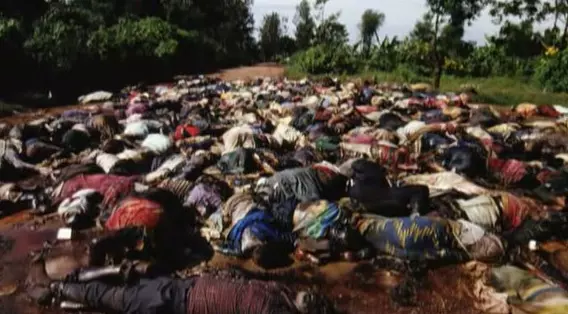Inyenyerinews readers have continously bombarded the news room with emails texts, twitter and whattsapp messages, demanding for answers on how Dr Kambanda was allowed to publish such a statement on our onlinenews. Dear readers bare in mind that inyenyerinews is open for all ideas and debates, that focus mainly on the region and our beloved nation in particular, you are all welcome to exchange views. Today one of the individuals who requested to stay anonymous decided to express his views, a bit different from Dr Kambanda’s ideas though. Scroll down and follow the writting which clearly enlights the understanding of intellectuals alone.


Dear Readers,
After reading Dr Kambanda’s post regarding his judgment on what
happened in Rwanda in 1994, and why he believes that it should not be
called a genocide, I decided to respond and show that his conclusion
is not supported in law. When I started to read Dr Kambanda’s post , I
expected a sound legal analysis and argument supporting his
submission. Unfortunately, most of the statements he made are either
false (number 7) or legally irrelevant ( 1,2,3 and 6). Moreover, Dr
Kambanda’s statements at point 4 and 5 are hardly justifiable under
the Genocide Convention. Here is how:

1. False Statement:
Dr Kambanda states that at the time of massacres, the then Rwandan
government troops were disarmed by the UN forces. This is false. The
UN withdrew the majority of its troops at the hight of the massacres.
There is no instance where the UN forces disarmed the FAR neither
before the death of president Habyarimana nor after. The FAR resisted
the APR forces for at least three months before retreating into the
Democratic Republic of the Congo with most of their weapons. I
challenge Dr Kambanda to cite the sources. In fact, he is the first
person to mention this, even among those who do not believe in the
genocide against the tutsi.
2. Irrelevant statements
Dr Kambanda talks about tutsi, hutu and twa who killed each other,
tutsi who killed tutsi, tutsi who were members of the interahamwe. I
refer him to the basic legal instrument about genocide, i.e the
Genocide convention. The convention defines genocide from the
perspective of the victim: As long as the victim is a member of a
protected group (ethnic, religion, racial or national group), and the
author of any one of the acts enumerated in article 2 of the Genocide
convention acted with the intent to destroy in whole or in part that
group; elements of the crime of genocide have been established. There
is an established jurisprudence by the United Nationas International
Criminal Tribunal for Rwanda (ICTR) and other tribunals to the effect
that, in 1994, tutsi were killed, as members of an ethnic group, with
the intent to destroy in whole or in part the said ethnic group. That
some perpetrators of the criminal acts belong to the protected class
has no bearing. What would Dr Kambanda say of individuals who have
been found guilty of genocide even when the court found that same
individuals have saved some other members of the tutsi ethnic group?
This has been raised in several cases before the ICTR but the court
found it to be irrelevant, or non dispositive to the culpability.
3. the issue of planning
I agree with Dr Kambanda that genocide, in practice, supposes a plan.
However, in law, there is no such requirement. This is why the ICTR
has found several individuals guilty of genocide, but acquitted them
of the charge of conspiracy to commit genocide. More so, Dr Kambanda
knows well that insufficient evidence does not mean absence of
evidence. In many cases brought before the ICTR, the prosecutor could
not establish beyond reasonable doubt that defendants conspired to
commit genocide. But again, the court decides on specific cases, i.e
specific individual defendants. Finally, the fact that the prosecutor
did not have enough evidence may be a result of several factors, such
as lack of insider’s testimonies which is very helpful to establish
charges of conspiracy in domestic criminal cases.
So the readers deserve a health, truthful and honest debate.
